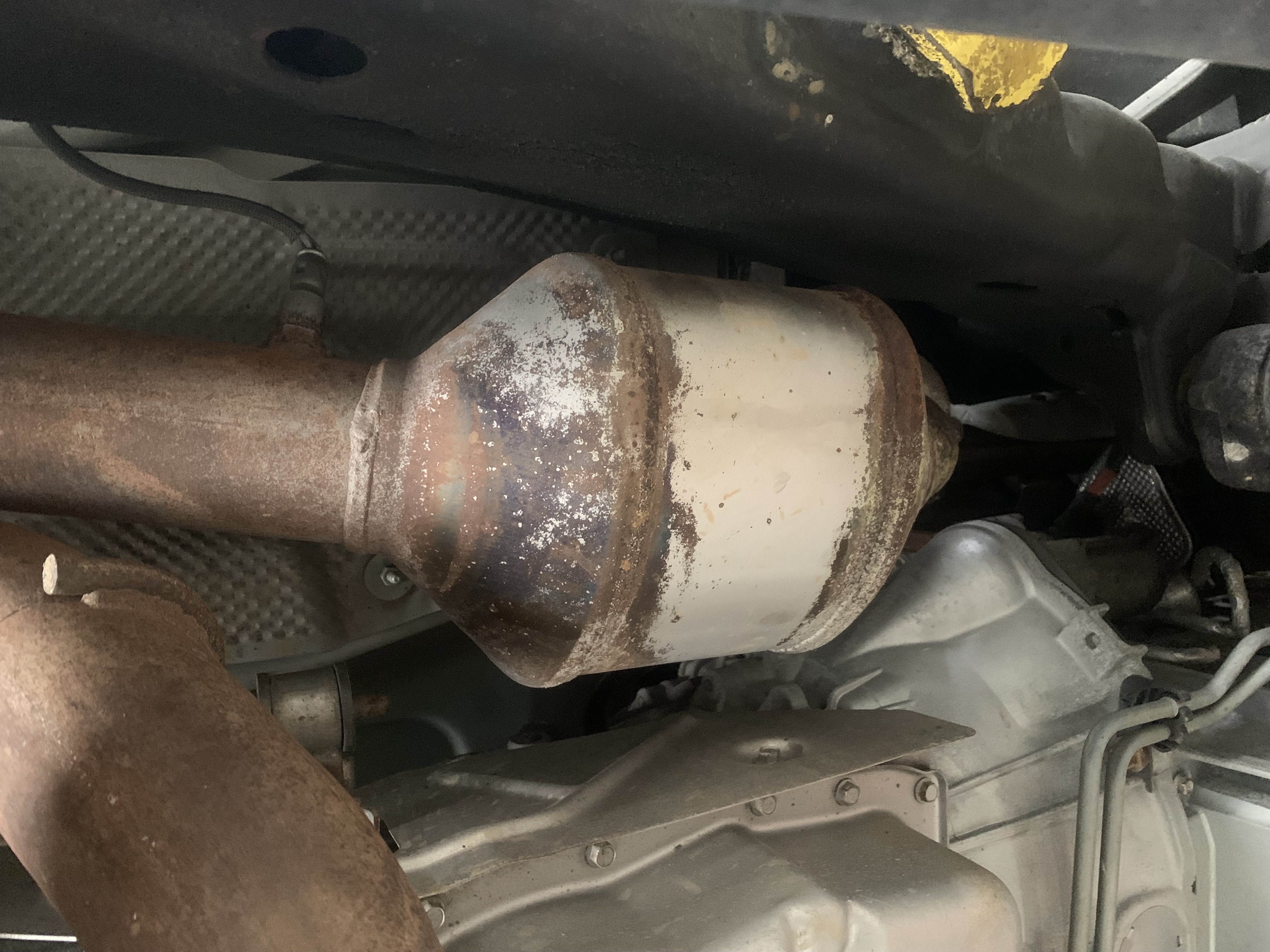
A catalytic converter found on a Fort F-250 pickup truck. Large truck CATs are in high demand for thieves because of the increase in the costs of platinum, palladium and rhodium. CAT theft is on the rise in South Carolina and thieves recently hit contractor and government vehicle on Fort Jackson Sept. 10-11. (Photo by Alexandra Shea)
CAT thief hits Fort Jackson
By Alexandra Shea, Fort Jackson Public Affairs
Catalytic converter theft is on the rise in South Carolina and Fort Jackson has become the latest victim of the current trend. Four contract and government vehicles had their CAT’s stolen the weekend of Sept. 10-11.
“We don’t know who the thief is yet,” said John Hughes III, Fort Jackson Police chief. “It’s still under investigation.”
CATs are an extension of a vehicle’s exhaust system that uses nonferrous metals such as palladium, rhodium and platinum to create a chemical reaction that removes pollutants that are harmful to the environment. It’s these metals that make CAT theft a lucrative business for thieves.
“It’s these metals that are valuable,” Hughes explained. “Larger vehicles are more attractive to thieves. Larger engines mean larger CATs. Large vehicles also have a higher ground clearance that makes it easier to crawl underneath them.”
Ricky Johnson, recreational aid at the Fort Jackson Auto Craft Center, agrees with Hughes.
“It’s very easy for a lot of them to get cut off. You can just slide under the car and they are hanging right there,” Johnson said of larger vehicles. “A lot of small cars, the (CAT) in up by the fan and radiator so you can’t just cut them off like you do when they are hanging on the bottom.”
Johns said there have been several Soldiers using the Auto Skills Center to replace stolen CATs recently. Soldiers residing off post or traveling in the surrounding Columbia areas have been affected by CAT theft.
“The last Soldier that was here was at the mall in Charlotte when someone stole them off his car,” Johnson said. “We are able to help them though. It’s a lot less (in installation costs) to come here and do it yourself.”
Luckily, South Carolina has taken measures to help reduce CAT theft by making it more difficult to sell the stolen metals and by holding recycling centers buying the stolen goods accountable. Bill 3991 was passed May 18, 2021, making it illegal to to buy or sell nonferrous metals and catalytic converters without a license or proof of ownership.
“South Carolina has some of the strongest anti-theft CAT laws,” Hughes explained. “A recycling center was recently closed because they were caught.”
The Richland County Sheriff’s Department arrested the owner of a local recycling center under charges of failure to collect, retain or show ownership documentation for over 40 CAT purchases the business made in June.
Under the the new law, the business owner faces fines, jail for up to three years and may be held financially responsible for the costs to replace and install a new CAT.
Hughes recommends the Fort Jackson community park their vehicles in well-lit and populated areas. He also said anti-theft device and cameras such as camera doorbells are available commercially and marking or etching the vehicles VIN number onto the CAT can help law enforcement to catch and charge thieves. Johnson recommends parking in a garage if available or installing an alarm in the vehicle.
“Just be smart,” Hughes said. “Generally, thieves are going to pick the easiest targets first.”
It can be difficult to see if a vehicle’s CAT has been stolen unless the owner specifically looks for damages, but according to Hughes it will be obvious once an owner starts their vehicle.
“I promise you will know the moment your car starts,” he explained. “It will be incredibly loud.”
Hughes said anyone who suspects theft should contact their local law enforcement immediately. He also recommends that post personnel check on their vehicles or government fleet often for theft especially if those vehicles remain parked for longer periods of time.
Hughes also stated that if anyone has information about CAT theft on post, they can make an anonymous report by calling (803) 751-2002 or by ICE Comment at www.ice.disa.mil.
“If you have information, please find a means to reach out to us,” Hughes said. “This is continuing to be investigated.





